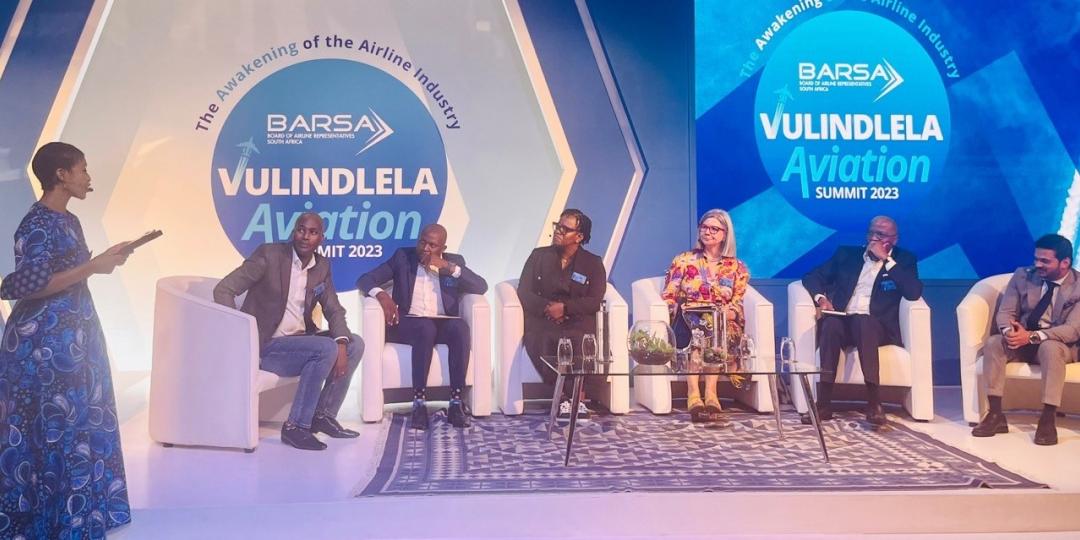The lack of an efficient e-visa regime in South Africa, along with regulatory red-tape facing international airlines wanting to enter the SA market, have been red-flagged as two of the most pressing issues that President Cyril Ramaphosa’s new cabinet must address urgently to achieve South Africa’s long-term tourism targets.
A high-level delegation of aviation and tourism partners have narrowed down the list of aviation’s biggest challenges at this year’s Board of Airline Representatives of Southern Africa (BARSA) conference, held at the Century City Convention Centre last month.
Minister of Transport, Sindisiwe Chikunga, listened actively to the stakeholders during BARSA’s conference - her first official event in the role.
Chikunga was joined on the day by Minister of Tourism, Patricia de Lille. The ministers’ joint appearance was considered a major show of support, but it was also just one example of the link between aviation and tourism the conference helped to highlight.
A panel discussion about enabling aviation and tourism in South Africa debated ways to support and enable tourism if the aviation industry and regulatory landscape functioned better.
Moderated by Blacky Komani, Tourvest Deputy CEO and Chairperson of the Tourism Business Council of South Africa (TBCSA), the discussion focused on roadblocks for foreign carriers wanting to add more long-haul seats and services, delays and other issues related to SA’s domestic and international air licensing councils, the high cost of domestic airline tickets post Covid-19, and developing new source markets abroad.
Speakers included Tshifhiwa Tshivhengwa, TBCSA CEO; Wrenelle Stander, Wesgro CEO; Sthembiso Dlamini, Gauteng Tourism Authority CEO; Professor John Lamola, Chairman and CEO of South African Airways (SAA); and Afzal Parambil, Emirates Regional Manager and BARSA Director.
Air connectivity
Stander highlighted that air connectivity was critical for economic growth, job creation and tourism. She said Wesgro’s Air Access Project, a public-private collaboration, had managed to double direct capacity into Western Cape since 2015. In December (2022), international traffic into the Western Cape recovered to more than 90% of pre-Covid-19 numbers; and, she said, 167 000 tourism jobs were created as a direct result of those visits.
According to Stander, new US services into the Western Cape are operating at more than 80% load factors. She said the US had led the recovery of tourism in South Africa and was a good example of how aviation benefitted tourism.
“When we go out to the airlines and say to them, we want to introduce a route to Bloemfontein, how do we make it affordable? What marketing support can be provided? … How do we all work together for the benefit of everyone on the ground? If we do that, we will increase capacity across the country. We do have plenty of hidden gems (attractions),” queried Tshivhengwa.
Parambil called on the transport minister to help secure the electricity supply at South Africa's international airports during loadshedding, while planned airport tariff increases, tourist safety, and smooth airport transitions were also discussed.
Brand SA must be promoted
Lamola wasn’t too concerned about political stability or instability in relation to attracting foreigners to SA. He said foreign travellers weren’t at all deterred from visiting places like Italy, which has its own political challenges.
But, Lamola did feel Brand South Africa needed to be promoted abroad, and he said SAA still had a role to play in that regard.
Stander said destination marketing would be better managed by South African Tourism, even though SAA - like Wesgro - can make a contribution.
Stander revealed that Wesgro is busy launching the Karoo as its second destination in the metaverse (it joins Table Mountain as the first of SA’s virtual tourism assets). “It’s really about using new channels to market South Africa," she added.
Speaking after the session, Wesgro’s CEO told Tourism Update: “I do believe the message coming out of here is that South Africa is open for business.”
Second- and third-tier source markets NB for visas
But, Parambil warned: “We all know that there are issues around safety and security, and Eskom’s ongoing national power cuts, but [growth is] about addressing the fundamental issue, which is: how easy is it for someone (from overseas) to get a visa?
“If you (stakeholders) continue to focus on South Africa’s top 10 source markets, you will never grow. The second- and third-tier source markets - focus on those, too,” he continued.
Tshivhengwa concluded that everybody in the room wanted to reignite demand for South Africa. He urged Chikunga to help level the playing field by eliminating unnecessary stumbling blocks.
“Visas are a stumbling block. Now we’re reintroducing SARS’ declaration requirement, which is going to create another blockage,” he said. “It is nothing new or unique to SA… The question is: how long is it going to take you to move through the airport?
Tshivhengwa added: “Many travellers may already have the wrong idea about South Africa - they really do think there are lions walking around! People are impatient, and they only love us (South Africa) after they have experienced us.
“We need to move faster, and we need to do it in a uniquely South African way - with humility and our humour, infused with a bit of unbuntu. (President Ramaphosa’s) Vulindlela campaign has moved things along, but we are still struggling to complete them (key projects like the e-visas). “
“If we want people to access our destination, we have to address visas and issues with operator permits, and get permits for airlines. And, we need to take it upon ourselves to look at the things that tourists complain about and make sure they are well taken care of.”
























